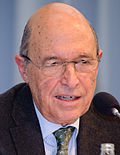9 April 2000 | |||||||||||||||||||||||||||||||||||||||||||||||||||||||||||||||||
All 300 seats in the Hellenic Parliament 151 seats needed for a majority | |||||||||||||||||||||||||||||||||||||||||||||||||||||||||||||||||
|---|---|---|---|---|---|---|---|---|---|---|---|---|---|---|---|---|---|---|---|---|---|---|---|---|---|---|---|---|---|---|---|---|---|---|---|---|---|---|---|---|---|---|---|---|---|---|---|---|---|---|---|---|---|---|---|---|---|---|---|---|---|---|---|---|---|
| |||||||||||||||||||||||||||||||||||||||||||||||||||||||||||||||||
 Results by constituency | |||||||||||||||||||||||||||||||||||||||||||||||||||||||||||||||||
| |||||||||||||||||||||||||||||||||||||||||||||||||||||||||||||||||
Parliamentary elections were held in Greece on 9 April 2000. [1] The ruling PASOK of Prime Minister Costas Simitis was narrowly re-elected, defeating the conservative New Democracy party. Simitis formed his third cabinet.
Contents
The election was characterized by the large electoral increase in support for both PASOK, and New Democracy. [2]





